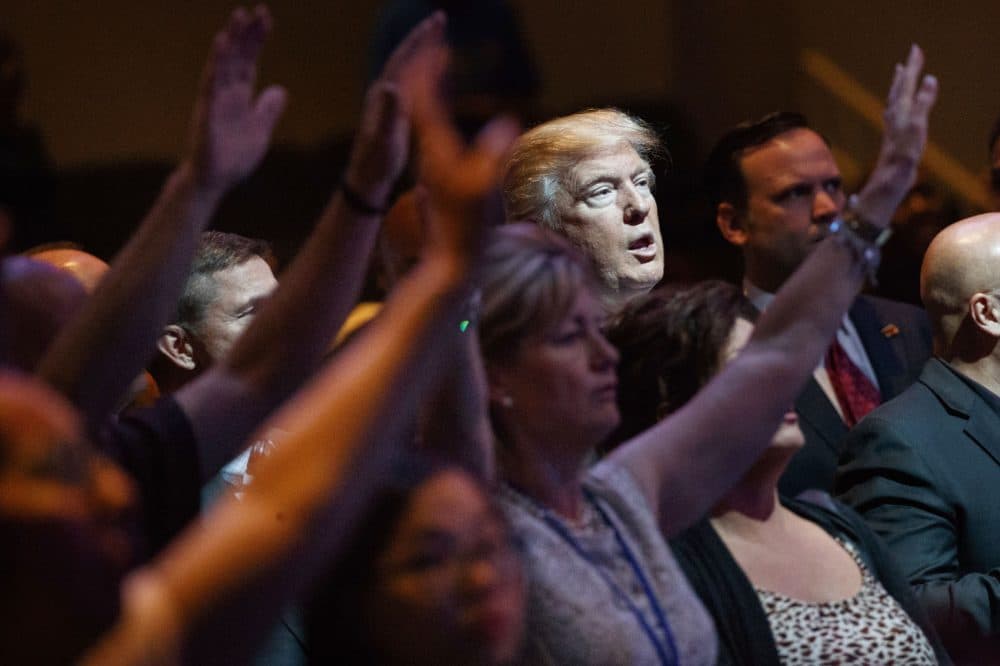Advertisement
Christian Group Calls Out Fellow Evangelicals Who Have Embraced Trump

Attorney General Jeff Sessions quoted the Bible in defense of President Trump's immigration policy calling for the temporary separation of children from their parents. Sessions cites the command in Romans 13 to "obey the laws of the government because God has ordained the government for his purposes."
Among those who disagree with Sessions are a small group of evangelicals known as Red Letter Christians. They eschew politics altogether, saying they choose instead to follow Jesus' teachings: feeding the poor, sheltering immigrants and tending to the sick.
Here & Now's Robin Young talks with Don Golden (@donrgolden), executive director of Red Letter Christians, about the group and its conflicts with conservative evangelicals.
Interview Highlights
On the thinking behind the group
"Our premise is that, to take the words of Jesus seriously, you have to take the poor seriously, you have to take the marginalized seriously, you have to take immigrants seriously, and you can't take some of the current Republican politics seriously, or at least commit yourselves to them, and be consistent with the words of Jesus."
On what it means to be an evangelical
"[David] Bebbington, the church historian, gives a classic definition, and that's someone who is committed to the seriousness of the Bible, who's committed to the centrality of the cross and who's committed to taking the message out to other people. And so within Bebbington's definition, it's pretty broad. Many of us in Red Letter Christianity would consider ourselves still evangelicals."
"Our premise is that, to take the words of Jesus seriously, you have to take the poor seriously, you have to take the marginalized seriously, you have to take immigrants seriously."
Don Golden
On the component of evangelizing and spreading the word
"That's one of the key phrases, but you know, when Jesus stood up to kind of give his mission statement, it's recorded in Luke 4, he's quoting from Isaiah, and he says, 'Proclaim good news to the poor,' and that word 'good news' in Greek is 'euangélion,' where we get the word 'evangel.' And so the central theme and message of evangelicalism is a liberation message to the poor, liberation to prisoners, recovery of sight to the blind, setting the oppressed free and proclaiming the year of the Lord's favor. So evangelicalism at its heart has the poor at the center."
On "Evangelical Inc." and how politics is shaping the religion
"There's a crisis in America right now. If you look at the U.N. report on poverty that just came out: 40 million poor people in America, there are 18 million of those who are extremely poor and 5.3 million of those live in third-world-level poverty. And yet at the same time we've just experienced a tax cut that's removed $1.5 trillion of money from essential services, mostly benefiting the wealthy. And those are issues of supreme gospel importance, of importance to the poor, the marginal, the weak. And so, any type of Christianity that becomes co-opted by a political party — especially a party that is associated with these types of policies — is toxic."
On evangelical leader Jerry Falwell Jr., president of Liberty University, and Red Letter Christians' efforts to meet with him
"We issued a public — first a private and then a public — request to talk with him and to debate with him, would Jesus support Donald Trump? If you want to know how faithful a people are to the God of the Bible, you look at not their religious buildings or how huge their campuses are, you look at the condition of the widow, the orphan and the poor. And I think our direct confrontation and the spirit of the Jewish prophets to confront power that is undermining and threatening the already vulnerable, I think that is considered threatening and I would say that fear is the main thing that permeated the atmosphere of Lynchburg, Virginia. People live in fear of what Jerry Falwell will say about anyone who would challenge that form of Christianity that's so closely aligned with political power.
"Lynchburg is really just a sort of a microcosm of the greater America. There are many in so-called Evangelical Inc., who are appalled by many of the policies coming out, not just [from] this president, but for many years even, from the religious right and from the governments that the religious right support. But the fear that exists in one's reputation or one's pocketbook and potentially losing your salary, people don't speak out."
This article was originally published on June 15, 2018.
This segment aired on June 15, 2018.